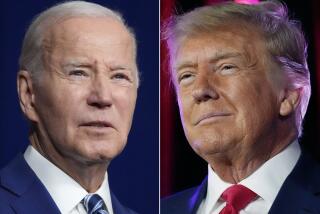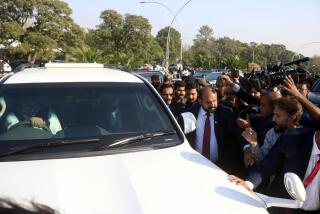Pakistanis crave fresh faces in politics
LAHORE, PAKISTAN â Down lanes and alleys thick with heat and commotion, where the clip-clop of horses pulling carts competes with the roar of dust-churning cars, the vendors of this ancient city spread out a profusion of wares.
Colored glass, crockery, copper engravings. Plastic buckets, wicker baskets, floral bouquets. The peddlers of the Old City area take pride in offering almost anything anyone could want.
Yet many Pakistanis, including the shopkeepers, say that what they truly need is not available here -- or anywhere else. With their country deep in political crisis, they say they are pining for a real national leader, someone selfless, inspiring and, above all, new.
Instead, their choices seem limited to the same names that have dominated the political scene for the last 20 years -- Benazir Bhutto, Nawaz Sharif, Pervez Musharraf -- and plenty of Pakistanis are sick of the lot.
âWeâve seen what theyâve done to this country. We donât seem to be able to get rid of these people,â said Mohammed Shafiq, 42, a local civil servant who stopped for a cup of milky tea in the old bazaar. âI donât know why Pakistan is repeating the past.â
It is a common complaint these days as Pakistan staggers into the third week of a state of emergency that Musharraf, the deeply unpopular president and army general, declared Nov. 3. Under de facto martial law, the constitution has been suspended, civil liberties have been frozen, and thousands of lawyers, human rights activists and opposition party workers have been thrown behind bars.
But many people on the street still speak freely.
And at tea stalls and in cafes, in offices and classrooms, many Pakistanis make clear their belief that their country ought to wash its hands not only of emergency rule and Musharraf, but also of some of the opposition figures jockeying to take his place. The time has come for wholesale change, they say.
Bhutto and Sharif each served two terms as prime minister. Allegations of corruption marred their tenures, and continue to make them unpalatable choices to many in this poor, debt-ridden nation.
Sharif, who was deported when he tried to return to Pakistan in September, remains in exile in Saudi Arabia, but is still head of his party and wants to come back to his homeland.
After eight years in self-imposed exile, Bhutto made a dramatic return last month amid rumors that she was close to cutting a power-sharing deal with Musharraf, who has ruled Pakistan since mounting a coup -- overthrowing Sharif -- in 1999. He was reelected president last month in a vote by lawmakers that many observers say was a sham.
The White House, which considers Musharraf a key ally in the battle against Islamic extremism, openly backs an accommodation between Musharraf and Bhutto as the best solution for Pakistan.
In weekend meetings in Islamabad, the No. 2 official at the U.S. State Department, John D. Negroponte, urged the two leaders to resume their stalled talks and tone down their increasingly confrontational rhetoric.
âIf steps were taken by both sides to move back toward the kind of reconciliation discussions they were having recently, we think that would be very positive and could help improve the political environment,â Negroponte told reporters in the Pakistani capital Sunday.
A day earlier, the U.S. diplomat met with Musharraf and pressed him to rescind emergency rule. But there was no sign that Musharraf would comply.
Since her return to Pakistan, the charismatic Bhutto has received tremendous media attention, especially from the West, where many portray her as a champion of democracy and progressive policies.
âI do appreciate the support the international community has given in asking Gen. Musharraf to ensure that the elections are free and fair, to condemn the emergency, and ask for him to retire as chief of army staff,â she said Sunday on CNNâs âLate Edition.â
But not all the people Bhutto seeks to lead agree with that image of her. Many believe that she had her chances as prime minister and failed. They resent what they view as U.S. attempts to prop up Musharraf and foist Bhutto on them.
Nor is Sharif an acceptable alternative.
âThey just want to be in power again,â Mazhar Iqbal, 27, who runs a tea stand, said dismissively. âI want somebody new, who loves this country and thinks of all the people of this country.â
No one fits that bill, added art student Mehru Nisa, 20. She said that the lack of inspiring new choices, and fatigue with the same old faces, had made many of her peers despair of politics.
âRight now we canât believe anyone, because of their dishonesty and insincerity,â said Nisa, as she drew sketches in the placid, leafy courtyard of the red-brick National College of Arts in downtown Lahore. âThey are all selfish. They donât know about the poor. They become rich, rich, rich, and the people become poor, poor, poor.â
Some Pakistanis are willing to give Islamist parties a shot at governing the country, an option that might send shivers throughout Washington, but no candidate of a religious party has broken into the top tier nationally.
The emergence of new leaders in Pakistan of any stripe has been hampered by a political culture that tends toward cults of personality, coupled with established party machines and an unabashed spoils system.
Bhutto, for example, is chairperson for life of the left-of-center Pakistan Peopleâs Party, or PPP. At her word, thousands of supporters can be mobilized to throng the streets, such as those who greeted her rapturously on her return from exile Oct. 18.
She is also a beneficiary of dynastic politics as the daughter of Zulfikar Ali Bhutto, himself a onetime prime minister. The elder Bhutto founded the PPP 40 years ago this month, was hanged by a military successor and remains a hero to many Pakistanis.
âThis is how itâs been for the last 60 years,â said shopkeeper Riaz Hussain, who is the same age as Pakistan, which was founded in 1947. âTen or 20 years ago, someone was governing, and now itâs his child. In 10 or 20 years, maybe itâll be his grandson.â
Dynasties are not just about the candidates but their supporters as well. When the head of a clan in Pakistan, a highly patriarchal society based on the extended family, decides which party to join or which leader to back, everyone is expected to fall in line, reinforcing a feudalistic style of politics that the parties take full advantage of.
One relative upstart to crack the political stranglehold of the old-timers is cricket legend Imran Khan, who several years ago traded in the white flannels of the gentlemanly sport for charity work and the dirty business of opposition politics. Khan is an idol to Pakistanâs youth, and he commands respect among the older generation as well, which sees him as untainted by the scandals of recent years and motivated by more than self-interest.
But translating popular support into party organization on the ground has been difficult for Khan, who heads the Movement for Justice party. The wide admiration and support Khan enjoys do not match the organizing powers of Bhuttoâs PPP or Sharifâs Pakistan Muslim League-N.
It is even tougher for Khan now that he is in jail, handed over to police by religious students during an anti-Musharraf demonstration last week at the University of the Punjab in Lahore.
âA new face doesnât dare stand against the old families, because he knows he canât win against these people,â said Haji Abdul Rehman Gill, as he waited for the first customers to show up at his copper-engraving shop.
Gill thinks that Pakistanâs only good leader was the countryâs founder, Mohammed Ali Jinnah.
Gill is fed up with Musharraf, with politics as usual, with the party leaders who have been in power for decades and promised change but have not followed through.
Yet for all his dislike of Musharraf, Bhutto and Sharif, Gill, like many of his countrymen, is at a loss as to who can break the mold and usher in a new era in politics.
âIâm 81 years old. Iâm one of the people who helped create this country,â he said, recalling the sense of hope that filled Pakistanis as their democratic Islamic republic took shape before their eyes.
He is less optimistic now.
âWe just pray to God to please give us some good leaders who have the capacity to improve our lives,â he said. âDemocracy is good -- if you have good leaders to rule you.â
--
More to Read
Sign up for Essential California
The most important California stories and recommendations in your inbox every morning.
You may occasionally receive promotional content from the Los Angeles Times.











